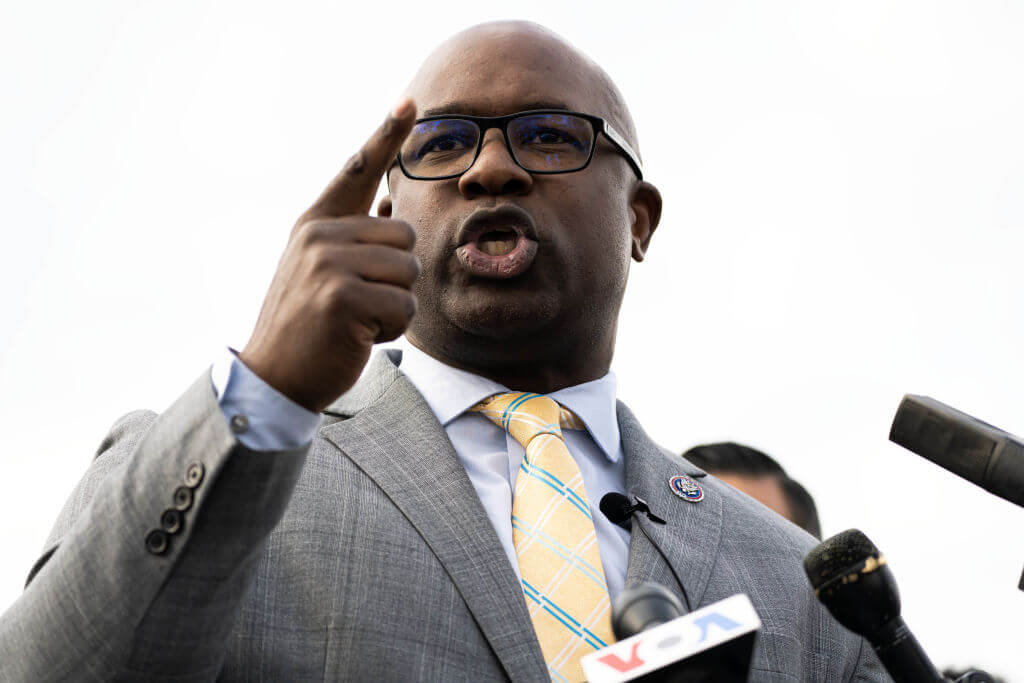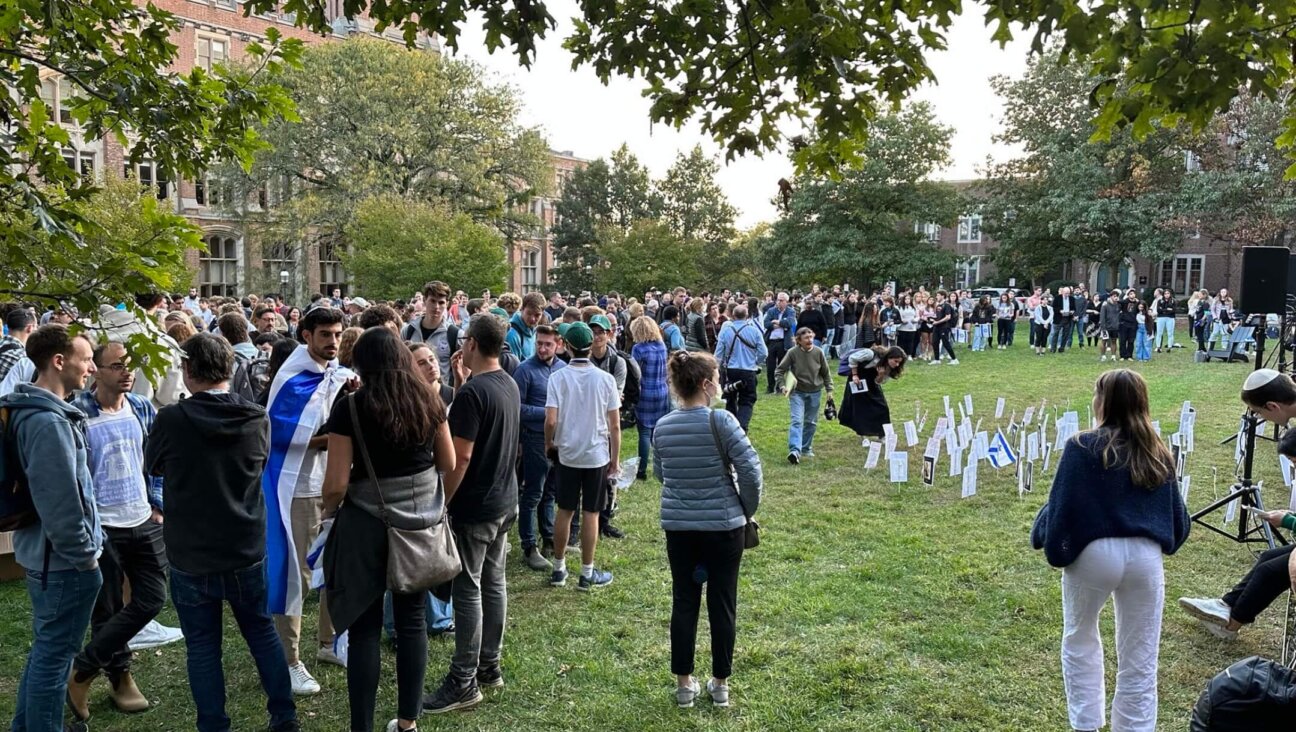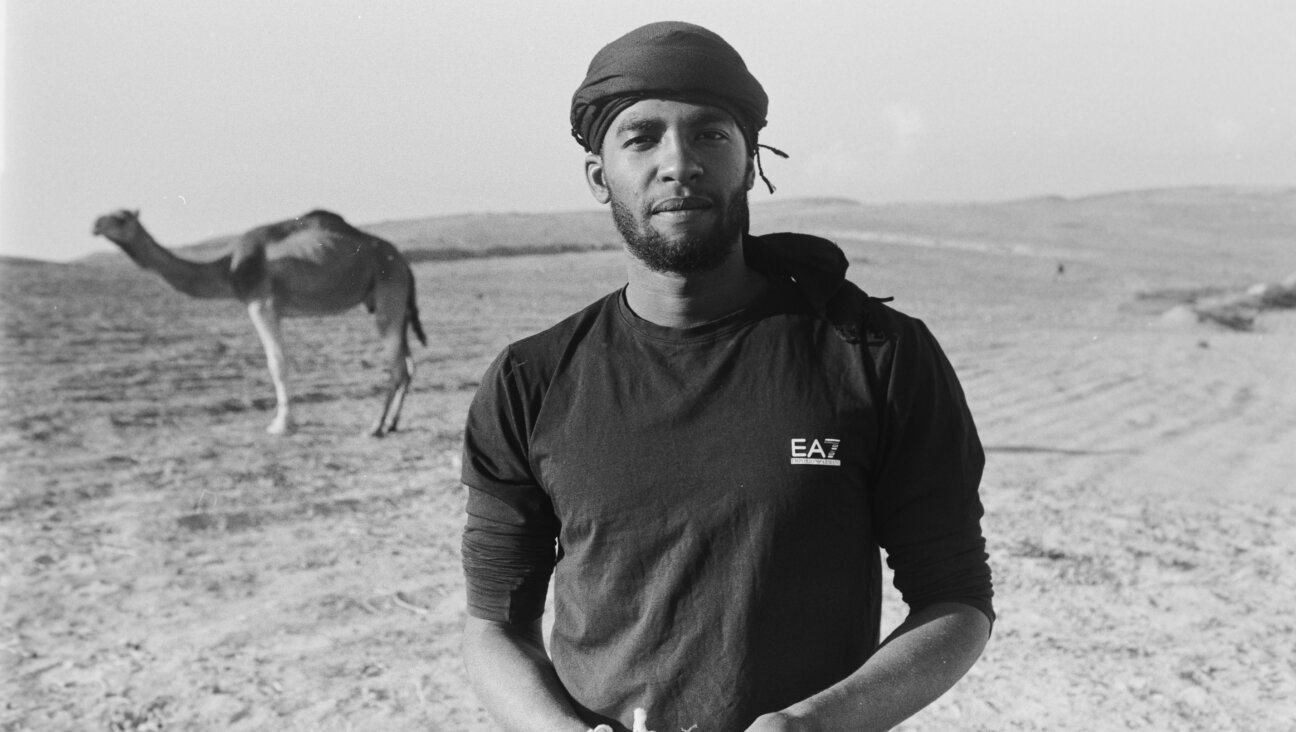Details emerge about hostage-taker as Jews upset by FBI remark on his motive

Congregation Beth Israel, Jan. 16, 2021. Photo by Haya Panjwani
Update: In a statement released late Sunday, the FBI described the hostage-taking as “a terrorism-related matter, in which the Jewish community was targeted.”
British authorities arrested two teenagers Sunday in connection with the Shabbat attack on a Texas synagogue in which a 44-year-old Briton named Malik Faisal Akram held a rabbi and several congregants hostage for 11 hours.
The teens, Akram’s sons according to NBC News, were picked up in South Manchester and are being held for questioning, according to the Greater Manchester Police. Akram, who died during the hostage rescue Saturday night, was from the industrial town of Blackburn, which is less than 30 miles from Manchester.

Malik Faisal Akram/Facebook screenshot
Reuters reported that after the hostages were freed Saturday night, their captor’s brother Gulbar posted on Facebook that Akram was mentally ill and that his family had spent hours during the crisis in the Blackburn police station “liaising with Faisal, the negotiators, FBI etc.”
“There was nothing we could have said to him or done that would have convinced him to surrender,” Gulbar wrote on the Blackburn Muslim Community’s Facebook page. “We would like to say that we as a family do not condone any of his actions and would like to sincerely apologize wholeheartedly to all the victims involved in the unfortunate incident,” the brother wrote. He also said the FBI is headed to England to work on the case.
Get the Forward delivered to your inbox. Sign up here to receive our essential morning briefing of American Jewish news and conversation, the afternoon’s top headlines and best reads, and a weekly letter from our editor-in-chief.
President Joe Biden said Sunday that the suspect had purchased weapons “on the street” after arriving in the United States, and, despite reports to the contrary during the siege, he did not have bombs with him.
“Apparently he spent the first night in a homeless shelter,” Biden said of Akram’s arrival in the country. “I don’t have all the details yet so I’m reluctant to go into much more detail.”
Motivations ‘not specifically related’ to Jews
The FBI’s remark on Saturday that Akram’s attack, which began during Shabbat services at Congregation Beth Israel in Colleysville, a Fort Worth suburb, was “not specifically related to the Jewish community” baffled and angered many Jewish leaders. Late Sunday, the FBI backtracked, issueing a statement on the incident making the connection to antisemitism explicit, calling it “a terrorism-related matter in which the Jewish community was targeted” and which is being investigated by the Joint Terrorism Task Force.
“We never lose sight of the threat extremists pose to the Jewish community and to other religious, racial, and ethnic groups,” the statement said. “We have had a close and enduring relationship with the Jewish community for many years. We continue to work tirelessly with the Secure Community Network, the Anti-Defamation League, the Jewish Federation, and others to protect members of the Jewish community from all potential threats.”
During the negotiations with law enforcement, Akram spoke repeatedly about a convicted terrorist who is serving an 86-year prison sentence in the United States on terrorism charges. He demanded that a Pakistani woman convicted of terrorism be released from a nearby prison.
After the hostages were safe, FBI Special Agent Matthew DeSarno spoke to the media Saturday night and disassociated Akram’s motives from antisemitism. It was that remark that sparked outrage.
“He was singularly focused on one issue, and it was not specifically related to the Jewish community,” FBI Special Agent Matthew DeSarno said after the hostages were safe. The statement prompted headlines in The Associated Press, the BBC and other outlets that led to further outrage on social media.
“Yes, it was a complete and total coincidence that the gunman ended up in a synagogue holding Jews captive,” Jaime Kirzner-Roberts, policy director at Friends of Simon Wiesenthal Center, tweeted Sunday. “Can’t believe the erasure of the Jew hatred at the core of this incident has already begun.”
Yes, it was a complete and total coincidence that the gunman ended up in a synagogue holding Jews captive.
Can’t believe the erasure of the Jew hatred at the core of this incident has already begun.https://t.co/1dA4nSPfVi
— Jaime Kirzner-Roberts (@jaimekr) January 16, 2022
A BBC headline declared: “Texas synagogue hostage stand-off not related to Jewish community – FBI.” The A.P. headline, “Hostage taker was not focused on Jewish community, FBI says,” ran atop an article on bostonglobe.com and many other news outlets.
“Hey @AP… fix your headlines. Are you kidding me?,” a Twitter user named S.L. Frostishook demanded. “ Why do you think he chose a SYNAGOGUE as his target exactly?”
Hey @AP… fix your headlines. Are you kidding me? In big bold writing, you declare “FBI: Hostage taker was not focused on Jewish community” Why do you *think* he chose a SYNAGOGUE as his target exactly???https://t.co/PC0nRLlOdE
— ?S.L. Frostishook ☃️ (@Stpolishook) January 16, 2022
Though he did not refer to DeSarno’s statement directly, Anti-Defamation League President Jonathan Greenblatt, said in an email to supporters: “We urge law enforcement and prosecutors to investigate the role antisemitism may have played in motivating the suspect.” Greenblatt also said that “it seems apparent, given what we know so far, that the hostage-taker chose his target carefully.”
Asked to explain DeSarno’s statement Sunday, the FBI’s office in Dallas referred the Forward to its Washington press office, which did not immediately respond but late that night issued the statement that said the Jewish community was targeted.
The incarcerated woman whose release Akram demanded is Aafia Siddiqui, a neuroscientist serving an 86-year term for shooting American soldiers in 2008. At her trial, Siddiqui railed against Jews and Israel and demanded the court genetically test jurors to assure none were Jewish.
Tema Smith, who works at the interfaith organization 18Doors and is a Forward contributing columnist, pointed out that the FBI statement had said that the demands of the hostage taker were not related to the Jewish community, not that the choice to take hostages at a synagogue wasn’t.”
A lot of news outlets seem to be missing the fact that the FBI said that the *demands* of the hostage taker were not related to the Jewish community, not that the choice to take hostages at a synagogue wasn’t… Like, come ON! Do better.
— Tema Smith (@temasmith) January 16, 2022
But others said that Akram’s rantings showed that he subscribed to the conspiracy theories Siddiqui promoted about Jews controlling world politics – and that this explained his choice of a synagogue as his target.
Authorities have not yet said whether law enforcement killed Akram or he killed himself on Saturday night, when some 200 officers staged a successful rescue of the synagogue’s rabbi, Charlie Cytron-Walker, and two other hostages (a fourth was released hours earlier).
Shortly after he first took the group captive, as the Shabbat service continued to be livestreamed via Facebook, Akram had repeatedly declared that he expected to die that day.
Cytron-Walker said Sunday that the hostage-taker “increasingly belligerent and threatening,” according to The Dallas Morning News.
“I am thankful and filled with appreciation for all of the vigils and prayers and love and support,” the rabbi wrote on Facebook, “All of the law enforcement and first responders who cared for us, All of the security training that helped save us.
“I am grateful that we made it out,” he added. “I am grateful to be alive.”
Cytron-Walker arrived at Beth Israel in 2006, the first full-time rabbi for a community that had begun eight years before as a small chavurah. It now has about 140 member-families, and has had many programs and partnerships with local mosques.
After a tense day of prayer and anxiety, there was an outpouring of relief and gratitude Sunday from the Jewish community and beyond. “Thank God for the freeing of the hostages,” tweeted U.S. Rep. Ilhan Omar, one of three Muslim members of Congress and someone who has clashed with establishment Jewish groups over her criticism of Israel. “Blessings to the members of Beth-Israel synagogue and the entire community.”
Thank God for the freeing of the hostages. Blessings to the members of Beth-Israel synagogue and the entire community.
— Ilhan Omar (@IlhanMN) January 16, 2022
Dame Karen Pierce, the British ambassador to the U.S., expressed her “horror and revulsion” at the incident, which she condemned as “an act of terrorism and antisemitism.”
The Orthodox Union said in a statement that it was “grateful first to the Almighty who provided strength and courage to the hostages and wisdom and patience to the law enforcement officers who responded to the crisis.”
But the incident only underscored fears that have been palpable since the 2018 massacre of 11 people at the Tree of Life synagogue in Pittsburgh and the killing of a woman a year later at the Chabad of Poway.
“Jews across America are watching the news from Texas and thinking the same thing,” tweeted Avi Mayer of the American Jewish Committee. “It could have been my synagogue. It could have been my children’s Jewish school. It could have been our Jewish community center.”
Jews across America are watching the news from Texas and thinking the same thing:
It could have been my synagogue.
It could have been my children’s Jewish school.
It could have been our Jewish community center.— Avi Mayer (@AviMayer) January 16, 2022
Many Jewish groups renewed vows to combat antisemitism, and to find ways to make Jewish communities more secure.
“We call on the Biden administration and Congress to take the threat of antisemitism seriously and work to address it with comprehensive policies informed by the lived experience of American Jews,” Sheila Katz, who leads the National Council of Jewish Women, said in a statement.
“Though only 2% of people in the United States are Jewish, the FBI reports that 58% of all religiously motivated hate crimes target Jews,” she added. “How many more people have to experience antisemitism before real action is taken to prevent attacks like this and address day-to-day discrimination?”
Note: This story has been updated to include a statement about the incident the FBI released late Sunday night.
























